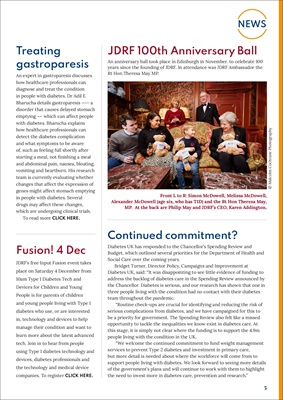
5
NEWS
Treating
gastroparesis
An expert in gastroparesis discusses
how healthcare professionals can
diagnose and treat the condition
in people with diabetes. Dr Adil E
Bharucha details gastroparesis ¬¬- a
disorder that causes delayed stomach
emptying ¬- which can affect people
with diabetes. Bharucha explains
how healthcare professionals can
detect the diabetes complication
and what symptoms to be aware
of, such as feeling full shortly after
starting a meal, not finishing a meal
and abdominal pain, nausea, bloating,
vomiting and heartburn. His research
team is currently evaluating whether
changes that affect the expression of
genes might affect stomach emptying
in people with diabetes. Several
drugs may affect these changes,
which are undergoing clinical trials.
To read more CLICK HERE.
Save the date
JDRF's next free Input Fusion event
takes place on 4 December. Type
1 Diabetes Tech and Devices for
Children and Young People is for
parents of children and young people
living with Type 1 diabetes who use,
or are interested in, technology
and devices to help manage their
condition and want to learn more
about the latest advanced tech.
Join in to hear from people using
Type 1 diabetes technology and
devices, diabetes professionals and
the technology and medical device
companies. The charity will release
more details soon - keep updated
and register by CLICKING HERE.
JDRF 100th Anniversary Ball
An anniversary ball took place in Edinburgh in November. to celebrate 100
years since the founding of JDRF. In attendance was JDRF Ambassador the
Rt Hon Theresa May MP.
L to R: Simon McDowell, Melissa McDowell, Karen Addington,
Alexander McDowell (age six, who has Type 1 diabetes),
Philip May and the Rt Hon Theresa May MP.© Malcolm Cochrane Photography
Continued commitment?
Diabetes UK has responded to the Chancellor's Spending Review and
Budget, which outlined several priorities for the Department of Health and
Social Care over the coming years.
Bridget Turner, Director Policy, Campaigns and Improvement at
Diabetes UK, said: "It was disappointing to see little evidence of funding to
address the backlog of diabetes care in the Spending Review announced by
the Chancellor. Diabetes is serious, and our research has shown that one in
three people living with the condition had no contact with their diabetes
team throughout the pandemic.
"Routine check-ups are crucial for identifying and reducing the risk of
serious complications from diabetes, and we have campaigned for this to
be a priority for government. The Spending Review also felt like a missed
opportunity to tackle the inequalities we know exist in diabetes care. At
this stage, it is simply not clear where the funding is to support the 4.9m
people living with the condition in the UK.
"We welcome the continued commitment to fund weight management
services to prevent Type 2 diabetes and investment in primary care,
but more detail is needed about where the workforce will come from to
support people living with diabetes. We look forward to seeing more details
of the government's plans and will continue to work with them to highlight
the need to invest more in diabetes care, prevention and research."